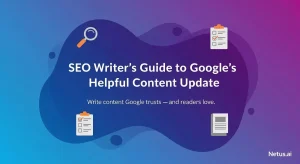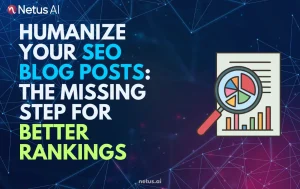
Why Google’s ‘Who, How, Why’ Framework Matters for EEAT | NetusAI
Why Google’s ‘Who, How, Why’ Framework Matters for EEAT AI can create articles in seconds. But here’s the truth: speed is not enough. Google wants
Plagiarism Quiz: Test Your Knowledge and Avoid Academic Pitfalls

Content writer and editor for Netus.AI
Plagiarism Quiz. In today’s academic and professional world, understanding plagiarism is crucial for both students and professionals alike. Schools, colleges, and other institutions put emphasis on educating individuals about the ethical implications of passing off someone else’s work as their own without proper acknowledgement. A comprehensive understanding of plagiarism can help avoid the negative consequences associated with the act.
Plagiarism can prove to be a complex issue beyond its basic definition. For students as well as freelance writers and journalists, delving deeper into the intricacies of plagiarism is vital. An engaging online plagiarism quiz can serve as an effective way to acquire a more nuanced understanding of the topic and its implications.
Plagiarism occurs when someone utilizes elements of another individual’s work and presents it as their own, without giving proper credit to the original author. Modifying certain words does not eliminate the fact that the content is still plagiarized. It is essential to cite the source to avoid this dishonest practice.
When writing, use quotation marks for direct quotes, and provide citations for paraphrased material, common knowledge, and specific facts or data. Additionally, always include a works cited page to list your sources.
Plagiarism holds significant consequences for various groups of people, including students, journalists, writers, bloggers, and website owners. Understanding these consequences and the importance of avoiding plagiarism are crucial aspects of maintaining integrity and credibility.
For students, academic institutions may penalize plagiarism by assigning a failing grade for the plagiarized work. Repeated offenses can lead to suspension or even expulsion, damaging the student’s academic career and future opportunities. Universities take plagiarism seriously since it undermines the ethics and academic dishonesty of the educational community.
Journalists and writers also face severe consequences for plagiarism. Journalists may be suspended from their organizations or even lose their jobs if plagiarism allegations are proven. Writers who have duplicate content in their works risk losing credibility and readership, which can damage their reputation and career.
In the case of bloggers, plagiarism can lead to a decline in traffic on their blogs. Readers can easily identify plagiarized content, leading to a loss of trust in the blogger’s work. Moreover, if a blog is promoting a business, plagiarism allegations can negatively impact the associated company’s reputation and potential clients.
Lastly, websites found guilty of plagiarism can suffer consequences such as damaged credibility and loss of customers. Plagiarized content may cause customers to doubt the legitimacy of the business or service provided by a website, even if they are authentic. Plagiarism also negatively affects SEO ranking, making a website less visible in search results and leading to decreased traffic.
In conclusion, avoiding plagiarism is essential for maintaining originality, preserving reputation, and protecting academic integrity. It is every individual’s responsibility – whether students, teachers, journalists, writers, or website owners – to ensure the proper use and acknowledgment of sources to prevent potential consequences.
Plagiarism checker tools have become essential for students and writers to ensure their work is original. These tools scan the text and compare it to online content, providing detailed results and identifying any duplicated content. It helps users properly quote and cite the sources to avoid plagiarism. Let’s dive into a quiz to improve our understanding of plagiarism.
Question 1: A student unknowingly copies and uses parts of another writer’s work without giving credit. Is this considered plagiarism?
Answer: 2
Question 2: Is citation necessary for widely known facts?
Answer: 1
Question 3: A student reuses parts of their previous projects without citing or mentioning the previous work. Is this plagiarism?
Answer: 2
Question 4: Which of the following is not a citation style?
Answer: 3
Question 5: A student doesn’t mention their collaborators’ names in a joint project. Is this plagiarism?
Answer: 2
Question 6: What should students do if they want to use their previous project in a new one?
Answer: 4
Question 7: Plagiarism is only essential for school works and university papers.
Answer: 2
Question 8: A student entirely paraphrases another writer’s work and claims it as their own work. Is this plagiarism?
Answer: 3
Question 9: A student recognizes a familiar phrase in their work but can’t remember the source. What should they do?
Answer: 3
Question 10: A blogger copy-pastes content from another website without giving credit. Is it plagiarism?
Answer: 1
The plagiarism awareness quiz helps readers better understand the complexities of plagiarism and the essential role of plagiarism checker tools in ensuring one’s work is unique and properly cited.
Plagiarism in academic writing refers to using someone else’s work or ideas without proper credit, which can include copying text from sources without citation, improperly paraphrasing someone’s work, or not citing sources when using their ideas. It is essential to understand the rules of academic integrity to avoid plagiarism.
There are various plagiarism detection tools available online, such as Turnitin and Grammarly, which can help you assess your work for potential plagiarism before submitting it. Additionally, you should always ensure proper citation of sources and follow your institution’s guidelines on avoiding plagiarism.
The consequences of plagiarism in college or university can be severe, depending on the institution’s policies. As mentioned in the Purdue OWL, consequences can include:
In some cases, students may also face additional disciplinary actions or even expulsion. It is vital to understand and follow your institution’s plagiarism policies.
If accused of plagiarism, you should:
It is essential to remain calm and address the situation professionally to resolve any misunderstandings.
Properly citing sources involves following a specific citation style (e.g., APA, MLA, Chicago) to credit the original author’s work accurately. This can include in-text citations and a reference list at the end of your paper. Make sure to follow the guidelines of your institution and your chosen citation style.
Paraphrasing involves rephrasing someone else’s work in your own words while still crediting the original source. Plagiarizing, however, is presenting someone else’s work as your own without proper credit. To avoid plagiarism when paraphrasing, ensure you are expressing the ideas in your own words and always cite the original source.

Why Google’s ‘Who, How, Why’ Framework Matters for EEAT AI can create articles in seconds. But here’s the truth: speed is not enough. Google wants

SEO Writer’s Guide to Google’s Helpful Content Update Keeping up with Google’s algorithm changes can feel like a relentless game of whack-a-mole. Just when you

Can AI Content Be Safe for SEO in 2025? Let’s start with the question of keeping every content strategist, SEO pro and blogger awake at

Humanize Your SEO Blog Posts: The Missing Step for Better Rankings You’ve done everything by the book. Your keyword research is impeccable. Your meta descriptions

How to Pass AI Detection Tests as an SEO Writer Let’s paint a familiar picture. You’ve just finished a blog post. The headline is sharp,

Why Your AI SEO Blog Isn’t Ranking (And How to Fix It) You embraced AI for your blog. The promise was intoxicating: high-quality content, published
@ 2024 Netus AI.